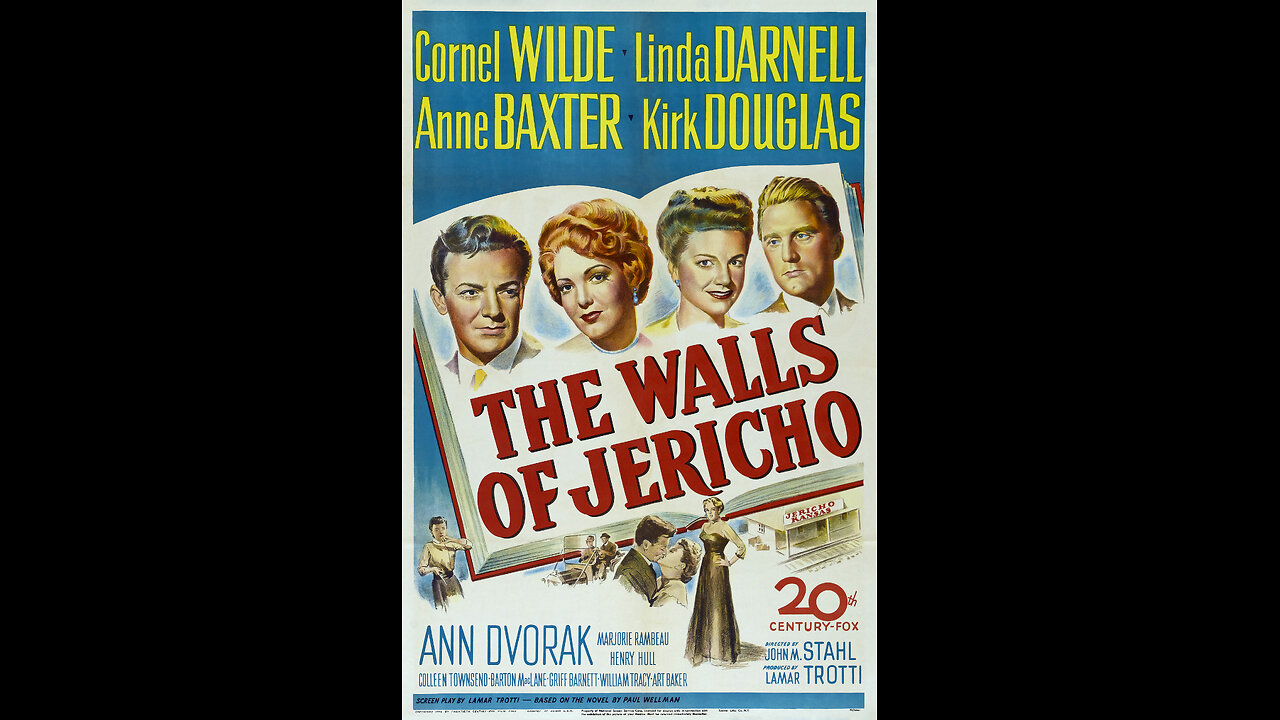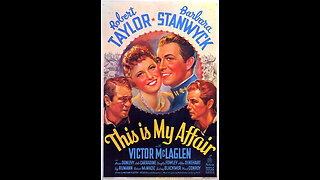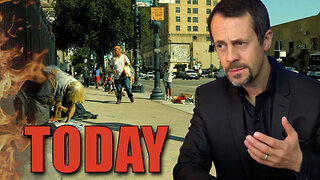Premium Only Content

The Walls of Jericho (1948) | Directed by John M. Stahl
"The Walls of Jericho" is an American drama film released in 1948, directed by John M. Stahl, a filmmaker known for his work in melodramas and for guiding actors to deliver compelling performances. This movie diverges from the biblical tale its title might evoke, instead offering a narrative steeped in the social and political intrigues of a small town in Kansas right after World War I.
The film weaves a complex story around Dave Connors (played by Cornel Wilde), an attorney with political aspirations, who finds himself entangled in a web of personal and professional dilemmas. His marriage to Belle (played by Ann Dvorak) is strained and unfulfilling, leading him to seek solace in the company of the more intellectually compatible Julia Norman (played by Linda Darnell), the wife of his best friend. The plot thickens with the introduction of Tucker Wedge (played by Kirk Douglas), a manipulative politician who aims to use Dave's ambitions for his own gain. The narrative delves into themes of ambition, morality, and the personal cost of political success, set against the backdrop of the American South's social dynamics during the post-war era.
"The Walls of Jericho" is notable for its exploration of complex characters and moral ambiguity, a hallmark of director John M. Stahl's filmography. The performances are strong, particularly those of Cornel Wilde and Linda Darnell, who bring depth and nuance to their roles. Kirk Douglas, in one of his early roles, showcases the intensity and charisma that would define his career. The film's portrayal of the intricate relationships and social structures within a small town is both engaging and thought-provoking, offering a slice of Americana through the lens of drama and intrigue.
The production values of the film, including its set design and cinematography, effectively recreate the era and setting, immersing the viewer in the post-war American South. The screenplay, adapted from the novel by Paul Wellman, balances the personal dramas with broader social commentary, though at times it veers towards melodrama.
While "The Walls of Jericho" delivers in terms of performance and production, it suffers from some pacing issues, with a narrative that sometimes feels uneven or overly complex. Modern audiences might find certain elements of the story and characterizations dated, particularly in its treatment of gender roles and relationships. The film's attempt to tackle too many themes at once can also lead to a lack of focus, diluting the impact of its more potent moments.
Additionally, the film's resolution might feel unsatisfying to some, as it wraps up complex moral and ethical dilemmas in a somewhat conventional manner, not fully exploring the ramifications of the characters' actions. This might reflect the filmmaking conventions of the era more than a specific shortcoming of the film itself.
Released in 1948 and directed by John M. Stahl, "The Walls of Jericho" stands as a compelling drama that captures the complexities of human relationships and societal pressures. With a talented cast including Cornel Wilde, Linda Darnell, Ann Dvorak, and Kirk Douglas, the film offers strong performances and a thought-provoking narrative. Despite its pacing and thematic issues, it remains an interesting piece of cinema from the post-war era, reflecting the moral and social questions of its time.
-
 1:41:08
1:41:08
Classic Films & Movies Archive
2 days agoThis Is My Affair (1937) | Directed by William A. Seiter
116 -
 20:20
20:20
Anthony Pompliano
9 hours agoWhy Smart Money Is Going All In On Bitcoin
2.39K -
 14:10
14:10
Dr. Nick Zyrowski
2 months agoThe AMAZING Health Benefits of NAC ( N-Acetyl Cysteine)
6.68K8 -
 5:14
5:14
Gamazda
1 month ago $3.11 earnedWhat Happens When You Mix Piano & Xylophone? Canon in D Like Magic!
7.38K31 -
 13:54
13:54
Mama to Five
12 hours ago $0.53 earnedWHAT I EAT IN A DAY! | FULL DAY OF MEALS AS A MOM OF 5
6.71K2 -
 1:01:18
1:01:18
Futures Edge: Finance Unfiltered with Jim Iuorio and Bob Iaccino
1 day ago $8.28 earnedLIVE Technical Analysis with Mike Arnold
56.2K2 -
 4:56
4:56
SLS - Street League Skateboarding
6 days agoDay in the Life of Pro Skateboarder Mariah Duran | Part 2
9.99K -
 14:32
14:32
Chubbyemu
2 days agoA Woman Drank 1 Liter Soy Sauce Colon Cleanse In 2 Hours. This Is What Happened To Her Brain.
20.8K10 -
 2:57:55
2:57:55
FreshandFit
3 hours agoAfter Hours w/ Girls
68.6K23 -
 22:23
22:23
Neil McCoy-Ward
13 hours agoThe Middle Class Just Collapsed...
14.1K6